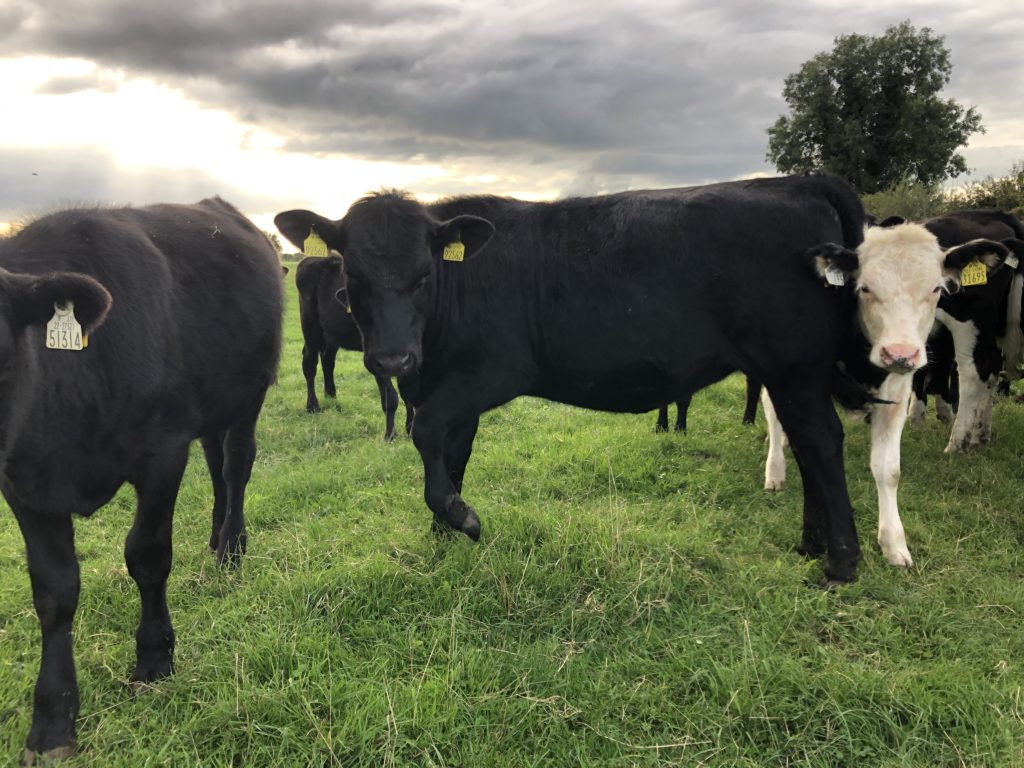When 23-year-old beef farmer David Craig from near Clonard, Co. Meath, made the decision to pursue a calf-to-beef enterprise on rented ground, he knew that in order for the venture to be economically sustainable, he would have to secure “every penny possible” from the marketplace for his beef cattle.
After completing a two-year agricultural course in Gurteen College, Co. Tipperary, focused on dry stock management, David decided to lease land and start his own farm enterprise.
Speaking to Agriland, David explained: “I’m currently renting two farms with approximately 80ac between the two.”

David’s father Clive is a beef and sheep farmer and David explained: “The way we operate is we buy the calves between the two of us but he (Clive) contract rears them for the first year and then they will come in to me on the second year.
“I take them in as yearlings and they go to grass then. I predominantly try to push them on good grass on paddock systems and try to get them finished before the second winter.”
The heifers that David is finishing this year will be processed in ABP Slaney and are the first of his cattle to be processed through ABP Food Group’s Advantage Beef Programme, which rewards farmers with a 20c/kg bonus for meeting the scheme’s criteria.
Commenting on the Advantage Beef Programme, David said: “I first heard about it earlier this year and I signed up for the scheme in February 2022, and there is a great team there to help with the process.”




“The security of an extra 20c/kg for meeting the programme’s criteria is a great help and and you’re guaranteed a market for your cattle the whole time.”
David had previously never finished cattle with the processor before and outlined that the Advantage Beef Programme staff helped with drafting the finished cattle and with arranging transport for the finished heifers to be taken to the factory.
The calf-to-beef process
David explained that over 60 calves were purchased for rearing this spring. Commenting on calf health, he outlined: “We have a great veterinary practice in Ballivor and there’s a great team of vets there that are big on calf health.
“We have a calf health protocol done up for when we buy in our calves every spring.”


95% of the calves David buys come direct from local dairy farms with the calves ranging from 3-6 weeks of age.
“The rule of thumb here is that each calf gets two bags of milk-replacer before they are weaned,” he said.
“We start them on a calf nut and gradually increase the level as we go. The calves get meal for their first season at grass but we ease back on meal when grass is plentiful in June and July.
“We wean them off meal for 6-8 weeks in late summer and the calves then go back on meal for the whole first winter. Before the second season at grass, the calves are weaned off meal.”
Dry spell
“The dry spell was a big issue here this summer,” David continued.
“The soil type would be really sandy here and grass growth slowed dramatically and grass nearly disappeared overnight.
“We increased the meal with the calves and some groups had to go back on silage for a while as well.”
Silage
All silage made on the farm is secured in round bales. David explained that he puts a big focus on cutting silage at the right time and ensuring it gets an opportunity to wilt.
“We mow it and ted it ourselves and draw the bales in ourselves also,” he said.
David is lucky in that his brother works full-time with a local contractor and admitted this gives him some leverage in getting his silage baled during the busy silage baling season.
Finishing cattle
Cattle were housed in mid-October last autumn and David said the reason for the slightly early housing date was “to keep grass in front of the sheep and have grass for ewes that were lambing early”.
Commenting on the turnout date, David said that cattle go to grass from mid to late February with the aim of having all cattle at grass by March 17.

“The aim is to have all cattle finished before the second winter but the reality is some cattle are not finished until the January of the second winter,” he said.
The last of the 2020-born calves were finished in mid January this year.
As David also works off farm, he has started to house his forward-type 2021-born heifers for finishing as he finds it easier to herd them from the shed with the evenings getting darker.
“The first pick for the factory came entirely off grass, the second pick were mainly off grass and the third bundle are from the shed,” he said.
Heifers are fed meal and silage and have access to a straw-bedded lye back while housed.
Sheep
David also has a keen interest in sheep.
“I have a small commercial flock but I keep predominantly pedigree Belclare and Texel sheep in my flock,” he said.
“We use a Belcare ram on the commercials and keep their ewe lambs for replacement breeders.


Between David and his father, they lamb 350-400 ewes depending on the year.
David has a clear passion for breeding pedigree sheep saying: “I love working with the pedigree sheep. All summer you’re away showing sheep and meeting people with the same interests. It’s the social aspect of it all.”
Commenting on how his flock’s progeny performed at agricultural shows this season, David said: “The showing went great this year. We had a number of champions and reserve champions.
“We were second in Tullamore Show with sheep and sale-wise, we had a full clearance of rams again this year in both breeds.”
David’s pedigree flock prefix is Abbeyview while his fathers’ pedigree flock prefix is Clonard.
